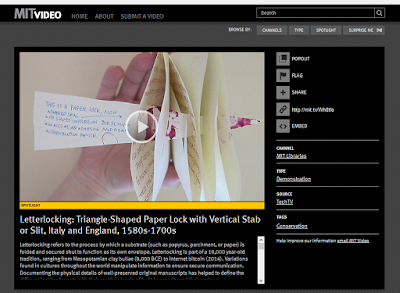Educational Video Resources
There are lots of different online educational video resources available. Some specifically designed for education and some that have both educational and entertainment value. Here are just a few of the Education Specific Video sites.Teacher Tube:
http://www.teachertube.com/Ted and TedED
If you haven't visited and watched a TED talk yet, now is a great time to do it. Many hours can be lost here that's for sure.http://www.ted.com/
Lots of playlists that you can choose from
And my choice:
http://ed.ted.com/
TEDEd allows you to build lessons around a TED Talk or YouTube video.
MIT Video
http://video.mit.edu/
and my choice was:
http://video.mit.edu/watch/letterlocking-triangle-shaped-paper-lock-with-vertical-stab-or-slit-italy-and-england-1580s-1700s-28525/
Open Yale
Similar to MIThttp://oyc.yale.edu/
National Geographic Video
http://video.nationalgeographic.com/
And HEAPS of others
http://videolectures.net/
http://academicearth.org/
http://aso.gov.au/ Not really educational, but I love this site
http://cosmolearning.org/
http://www.mathtv.com/
http://www.abc.net.au/tv/documentaries/online/
This is just few of the websites that give you access to free online educational content.
Online Learning Tools Assessment Task 2
Choose 5 of the above Video Websites and using the criteria below, evaluate and write up results in your Blog - create a new post in previously used blog.. If necessary, choose a topic that you would like to learn about.- details about the learning site, tool or tutorial
- A rank of how easy it was to find (either stars or rank of between 1 and 5)
- A rank of how easy it was to use
- A rank about how well it covered the topic
- An overall rank about how you felt about the learning experience.
TAEDEL401A - Planning a course and sharing the load
Planning your course (and lessons)
This is the beginning of your assessment tasks for this unit. The preparation, discussions and planning will done in groups - your training colleagues.
In today's session, we will address these 2 areas:
1.3. Identify and assess constraints and risks to delivery
1.4. Confirm personal role and responsibilities in planning and delivering training with relevant personnel
Each group has been given a unit from the CUL11 training package (or an imported unit).
I have purposely selected units that are at a certificate III level or lower.
The documents that you have been provided with can be found at the training.gov.au website. They will provide you with all of the information you need to plan, create resources and deliver your unit.
The documents are broken into:
The Elements and Performance Criteria
This outlines the competencies that need to be covered in the lessons for the unit. What students should be able to do at the end of the unit
The required Skills and Knowledge
The Skills and Knowledge that will be used by the students to meet the performance criteria and the evidence requirements.The evidence guide
Provides assessment guidelines - what the students need to be able to prove that they can do and be assessed on.The Range Statement
This area defines some of the terminology within the elements and performance criteria (bold italic type) and the variety of tasks that could be undertaken as part of the assessment.Activity 1 - PLANNING your program
Take into account the number of hours allocated to the unit
Take into account that each member of the group will be delivering 2 half hour sessions
As a group, plan and document how you will deliver your unit. Your plan should include:
- The number of lessons (using above criteria)
- Who will be delivering each lesson
- The learning outcomes of each lesson - i.e. the Elements and performance criteria and the required skills and knowledge.
- How you will assess the unit
Please keep this document - it will form part of your assessment once the session plans are added and MUST be submitted to be graded. DO NOT LOSE IT. Make sure that someone responsible is in charge of saving and maintaining the file and collecting the session plans when complete.
Although this is a group task, each student will be accountable for their own session plans and delivery.
http://www.education.vic.gov.au/training/providers/rto/Pages/purchasingguides.aspx


























